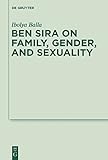Ben Sira on Family, Gender, and Sexuality / Ibolya Balla.
Material type: TextSeries: Deuterocanonical and Cognate Literature Studies ; 8Publisher: Berlin ; Boston : De Gruyter, [2011]Copyright date: ©2011Description: 1 online resource (334 p.)Content type:
TextSeries: Deuterocanonical and Cognate Literature Studies ; 8Publisher: Berlin ; Boston : De Gruyter, [2011]Copyright date: ©2011Description: 1 online resource (334 p.)Content type: - 9783110247466
- 9783110247473
- 229 .407 22
- BS1765.53 .B35 2011eb
- online - DeGruyter
- Issued also in print.
| Item type | Current library | Call number | URL | Status | Notes | Barcode | |
|---|---|---|---|---|---|---|---|
 eBook
eBook
|
Biblioteca "Angelicum" Pont. Univ. S.Tommaso d'Aquino Nuvola online | online - DeGruyter (Browse shelf(Opens below)) | Online access | Not for loan (Accesso limitato) | Accesso per gli utenti autorizzati / Access for authorized users | (dgr)9783110247473 |
Browsing Biblioteca "Angelicum" Pont. Univ. S.Tommaso d'Aquino shelves, Shelving location: Nuvola online Close shelf browser (Hides shelf browser)

|

|

|

|

|

|

|
||
| online - DeGruyter Il dossier della "domus divina" in Egitto / | online - DeGruyter Vestigia Vergiliana : Vergil-Rezeption in der Neuzeit / | online - DeGruyter Neuer Wettstein : Texte zum Neuen Testament aus Griechentum und Hellenismus. Teilband 1.2-2. Texte zu den Evangelien und zur Apostelgeschichte . Texte zum Matthäusevangelium ; Matthäus 11–28 / | online - DeGruyter Ben Sira on Family, Gender, and Sexuality / | online - DeGruyter Ethical Dimension of Cult in the Book of Isaiah / | online - DeGruyter Ablution, Initiation, and Baptism : Late Antiquity, Early Judaism, and Early Christianity / | online - DeGruyter Kritische Religionsphilosophie : Eine Gedenkschrift für Friedrich Niewöhner / |
Frontmatter -- Acknowledgments -- Table of contents -- Introduction with literature review and methodology -- Chapter 1: Respect for fathers and mothers and the treatmentofwidows -- Chapter 2: The anxiety of bringing up children: teachings on sons and daughters -- Chapter 3: Teachings on marital relationships -- Chapter 4: Teachings on sexual behaviour that is either illicit and/or discouraged, including adultery and approaching prostitutes, virgins, maidservants -- Chapter 5: Wisdom poems -- Chapter 6: Conclusion -- Appendix -- Bibliography -- Index of modern authors -- Index of ancient texts
restricted access online access with authorization star
http://purl.org/coar/access_right/c_16ec
The book investigates Ben Sira’s attitudes toward all matters pertaining to sexuality in the context of family relations and gender issues. The author’s seemingly negative attitude to women, the anxiety expressed in the discussions of marital and extramarital relations, and the disciplining of children can lead to the assumption that the work has a negative attitude toward sexuality. Ben Sira’s book is a combination of carefully composed wisdom poems and of teachings on everyday issues, including marriage, family life, self-control, desires, and sexual promiscuity. The sage dedicates a greater number of passages than other wisdom books to the discussion of social relations especially in regard to family. In so doing his regular point of departure seems to be what benefits or damages these relations mean, and whether they bring disgrace to a person, especially through sexuality. In addition, we have to make a distinction between the attitudes of the writer of the original Hebrew text of the book and that of the Greek translator. The two texts, produced in different social settings, times and places, differ at times in regard to sexuality.This book examines the wisdom poems, some characterized by openness about issues of eroticism, and all sayings that concern matters pertaining to sexuality found in discussions of passions, family relations and gender issues, and warnings against sexual wrongdoing. All this is done with a special regard to the differences between the Hebrew original text and the Greek translation.
Issued also in print.
Mode of access: Internet via World Wide Web.
In English.
Description based on online resource; title from PDF title page (publisher's Web site, viewed 28. Feb 2023)


